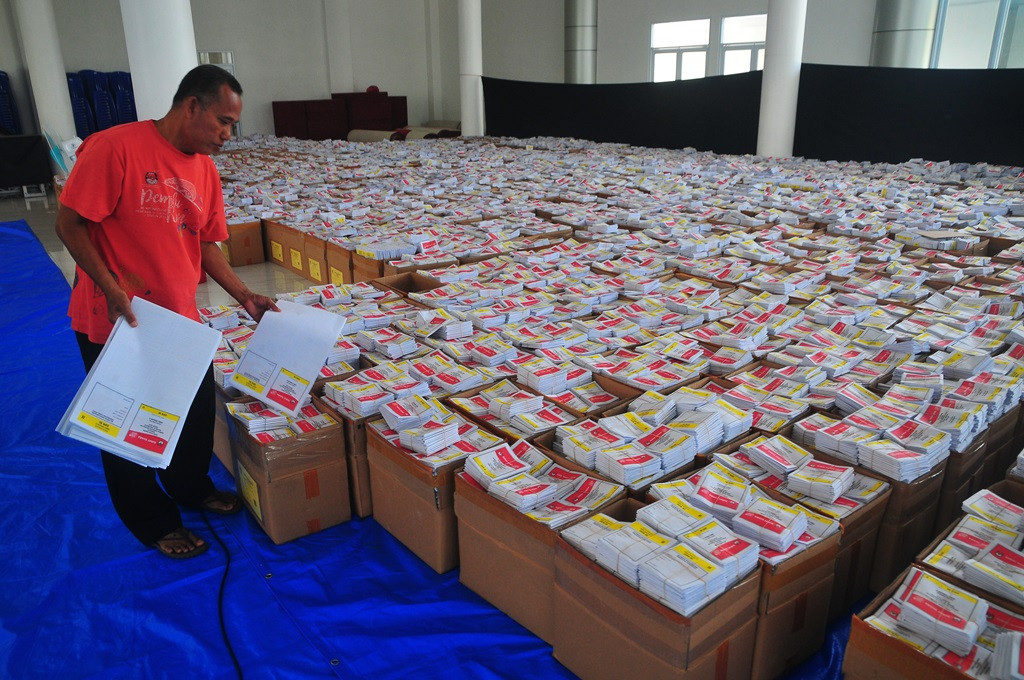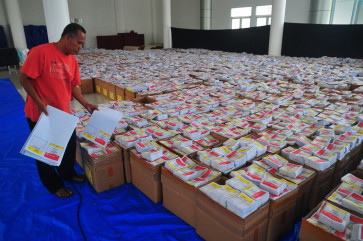Popular Reads
Top Results
Can't find what you're looking for?
View all search resultsPopular Reads
Top Results
Can't find what you're looking for?
View all search resultsThe economics of Indonesia’s general election
A study conducted by the Poltracking Indonesia survey institute in October 2022 found that some 31 percent of Indonesian voters were "rational" and indicated the number would rise for the upcoming election.
Change text size
Gift Premium Articles
to Anyone
 A General Elections Commission (KPU) official shows a damaged ballot paper at a ballot sorting center in Kudus, Central Java, on Dec. 29, 2023. The election organizer in Kudus found more than 4,000 damaged ballots ahead of voting day for the upcoming general election, slated for Feb. 14, 2024. (Antara/Yusuf Nugroho)
A General Elections Commission (KPU) official shows a damaged ballot paper at a ballot sorting center in Kudus, Central Java, on Dec. 29, 2023. The election organizer in Kudus found more than 4,000 damaged ballots ahead of voting day for the upcoming general election, slated for Feb. 14, 2024. (Antara/Yusuf Nugroho)

The elections in Indonesia once every five years play a crucial role in shaping the country's economic landscape. In many cases, the intersection of politics and economics is evident as political decisions impact economic policies, investor confidence and, ultimately, the well-being of the population.
This article explores the key economic aspects of elections, particularly the market behavior of rational voters, the ramifications of vote-buying on leadership quality and corruption and the complex dance between populism and budget risks.
The rational choice theory suggests that voters act in their best economic interest when choosing certain political candidates. In the context of Indonesian elections, this translates to an electorate that assesses candidates based on their proposed economic platform and welfare programs, taking into account the current available fiscal space.
The supply and demand analogy can work for rational voters, where the demand for quality public goods and services meets the supply of candidates offering viable solutions. Much like consumers demanding quality products, rational voters seek good economic policies, governance and welfare programs. Meanwhile, political parties and candidates, in turn, function as entities offering platforms and policies to satisfy the demands of rational voters.
The supply and demand analogy in politics mirrors the dynamics of a market, where voters act as consumers seeking candidates who efficiently supply the political solutions they see fit. Voters will cast their votes for the candidates if they think the candidates can fulfill their demands. In contrast, they will vote against the candidates if they think otherwise or if the candidates have broken previous promises.
The electorate's ability to assess and prioritize candidates based on their economic policies is a cornerstone of determining the quality of leadership, which ascends to power and democracy as a whole. The question is: How big is the rational voter bloc in Indonesia to further enhance the quality of democracy, governance and economic policy?

A study conducted by the Poltracking Indonesia survey institute in October 2022 found that some 31 percent of Indonesian voters were rational and indicated the number would rise in the upcoming election. Younger voters, with much better access to the internet and information, accounted for most of that figure.

















